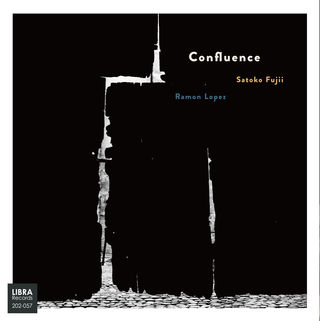Jazz CD Review: Satoko Fujii’s “Confluence” — Invigorating Experiments
By Michael Ullman
Satoko Fujii and Ramon Lopez are clear-eyed adventurers; this is free jazz that shimmers with inquisitive transparency.
Satoko Fujii, Confluence (Libra Records)
 Since 1995, when she recorded Something About Water with a second pianist, the estimable Paul Bley (also her teacher), Satoko Fujii has made (by my count) close to sixty albums for Libra Records. She’s hard to keep up with. Last year Fujii turned sixty, an important milestone in Japanese culture, and she celebrated by issuing an album a month featuring her compositions: solos, duets, trios, small groups, and finally big band sides. She’s made a half dozen duet albums with her husband, trumpeter Natsuki Tamura. Confluence, a duo recording made with Spanish drummer Ramon Lopez, comes at the end of this prolific period. Fujii calls the music here “a kind of miracle for me.” She explains: “we didn’t talk about anything before we played…When we started recording, something came down to me that I didn’t expect. I felt that the room was filled with music and love.” “It was such a beautiful moment,” she adds, “that I ended up playing in a very quiet and peaceful way.”
Since 1995, when she recorded Something About Water with a second pianist, the estimable Paul Bley (also her teacher), Satoko Fujii has made (by my count) close to sixty albums for Libra Records. She’s hard to keep up with. Last year Fujii turned sixty, an important milestone in Japanese culture, and she celebrated by issuing an album a month featuring her compositions: solos, duets, trios, small groups, and finally big band sides. She’s made a half dozen duet albums with her husband, trumpeter Natsuki Tamura. Confluence, a duo recording made with Spanish drummer Ramon Lopez, comes at the end of this prolific period. Fujii calls the music here “a kind of miracle for me.” She explains: “we didn’t talk about anything before we played…When we started recording, something came down to me that I didn’t expect. I felt that the room was filled with music and love.” “It was such a beautiful moment,” she adds, “that I ended up playing in a very quiet and peaceful way.”
What makes that quiet and peace possible is the clarity, and even sometimes the simplicity, of her lines. “Three Days Later,” for instance, begins with a gently moving series of chords over Lopez’s tom toms. But, after a few seconds, Fujii stops and we hear her last chord slowly die out while her percussionist waits. Then they start up again, and again, the whole held together by a sense of transparency and patience. It has a shape: there is a middle section in which Fujii plays more forcefully, plucks at the strings briefly, and then begins musing again, this time more restlessly. Again, the series of chords is heard in a slightly more agitated style until Fujii stops the motion with a single bass note. The piece goes on, with Lopez asserting himself for a brief moment and then bowing out with a few strokes on his cymbals. He’s a remarkable drummer: I found myself listening as carefully to his infinitely respectful accompaniments as much as I did to Fujii. He reacts instantly to her, but also suggests new directions.
“Winter Sky” begins with a rim shot, a pause, and another rim shot. Then, as if he were collaborating with himself, Lopez introduces a kind of conversation among his drums: tom toms and bass drum pitched against a high pitched snare.Fujii enters by moving into the piano, intially plucking the instrument’s strings, then moving into generating sweeping gestures. The sound is sunnier once she returns to the piano’s keys. Eventually, she pounds out a chordal figure in a surprisingly powerful way. (She admits to being influenced by McCoy Tyner.)
The most vigorous piece is called “Run!” Fujii begins with quicksilver lines that range over the piano in a big, two-handed way. Lopez enters at his most outgoing. Amusingly, the pianist brings the race to a stop, briefly, with a couple of awkward chords. Lopez begins again with a dark passage in the left hand. It’s a sinister sound in both senses of the word. More typical of Confluence is “Quiet Shadow,” which kicks off with a high-pitched drone and what sounds like a bow being drawn across the edge of a cymbal. It feels — like so much of this invigorating album — like an experiment. Where will the sounds we are both making lead? Fujii and Lopez are clear-eyed adventurers; this is free jazz that shimmers with inquisitive transparency.
Michael Ullman studied classical clarinet and was educated at Harvard, the University of Chicago, and the U. of Michigan, from which he received a PhD in English. The author or co-author of two books on jazz, he has written on jazz and classical music for The Atlantic Monthly, The New Republic, High Fidelity, Stereophile, The Boston Phoenix, The Boston Globe, and other venues. His articles on Dickens, Joyce, Kipling, and others have appeared in academic journals. For over 20 years, he has written a bi-monthly jazz column for Fanfare Magazine, for which he also reviews classical music. At Tufts University, he teaches mostly modernist writers in the English Department and jazz and blues history in the Music Department. He plays piano badly.


An outstanding review. I happen to be listening to Confluence while reading this, and Michael sums it up perfectly.